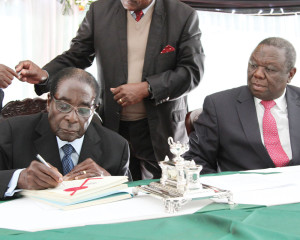The final deadline for voter registration in Zimbabwe’s watershed elections on July 31 passed this week.
What is being billed as Zimbabwe’s first “free and fair” elections for president takes place amid concerns by Prime Minister Morgan Tsvangirai, who is squaring off against President Robert Mugabe, that Mr. Mugabe will rig the elections in his favour. Opposition figures also worry about violence against Mr. Tsvangirai’s supporters similar to bloody reprisals several years ago. Last week, after vigorous protest and debate, Zimbabwe’s high court ruled that elections would be held July 31, the date chosen by Mugabe.
An election has been promised ever since a new constitution was ratified in May limiting elected leaders to two terms in office. When July 31 was announced, opposition parties and the Southern African Development Community (SADC), a regional forum, were keen to delay the vote until well into August to allow an array of reforms to take hold. This led Mugabe to threaten to pull out of the SADC, saying its call to postpone elections interfered with Zimbabwean internal affairs.
At this point, Tsvangirai appears certain to defeat Mugabe, considered an old fox, whose 33-year rule in Zimbabwe has been controversial to say the least. Tsvangirai, addressing thousands of supporters in the city of Marondera, about 50 miles east of the capital, Harare, said last week that “there are no reforms in the media, and [no] other reforms to ensure free and fair elections” and that he will participate in the vote “with a heavy heart.”
Some 200 Tsvangirai supporters are believed to have died in politically-related cases in 2008 before the government of national unity was formed, which brought Tsvangirai and Mugabe together into what has been a fractious relationship in government. Zimbabwean political commentators have blasted Mugabe, who is elderly and said not to be in good health, for his latest threat to pull out of SADC. Mugabe did unilaterally pull out of the Commonwealth in December 2003.
Political analyst Takura Zhangazha wrote in a recent blog that Mugabe’s statements were “unfortunate…. Zimbabwe’s independence would not have been won without our neighbours…. It therefore becomes important to emphasise that Zimbabwe has an umbilical cord with the Southern African region.”
The July 31 elections will also cover votes on parliamentarians, senators, and local government officials in a country that has an estimated population of 13 million people.
Mugabe heads what is known as the Zimbabwe African National Union Patriotic Front (ZANU-PF). Among the opposition, Tsvangirai leads the largest party, the Movement for Democratic Change (MDC).
On the ground, there have been sharp differences between Mugabe’s ZANU-PF and the opposition over reforms – particularly in the media and security. While Mugabe enjoys the lion’s share coverage of his rallies from the state press, Tsvangirai and others are ignored or asked to pay for them to be covered.
When voter registration ended this week, the election supervisory body compiled and published the number of eligible voters. The Army and police are set to cast their votes early since they will be on duty. There are concerns that security forces will vote for Mugabe after reports surfaced that commanders openly told them to vote for the octogenarian leader.
Raymond Majongwe, who leads a vocal opposition party called Progressive Teachers Union of Zimbabwe (PTUZ) says although the situation on the ground is not satisfactory, it was crucial to vote nonetheless.
“Even if Tsvangirai and his allies get 100 more years for the election to happen, they will never be free and fair for as long as ZANU PF is in the equation.
“Instead of crying now, Tsvangirai should have demanded the reforms he is talking about [earlier] when he became part of the government. It is now too late. You will never hear a scenario where the lion and a zebra say we are ready to go hunting together,” said Majongwe.











